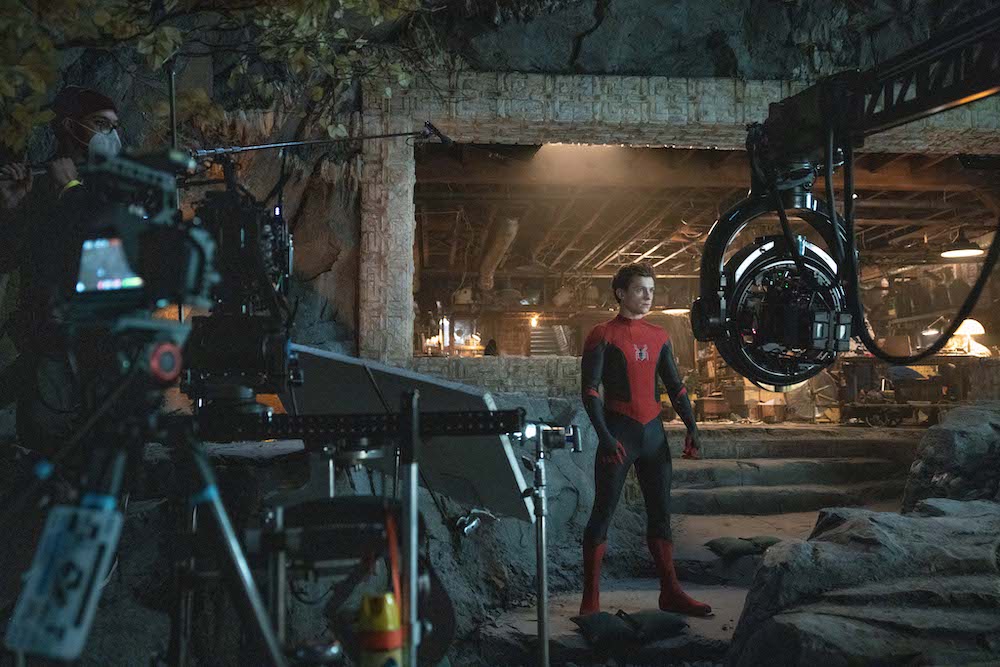Create a free profile to get unlimited access to exclusive videos, sweepstakes, and more!
How the ending of 'No Way Home' presents a fresh slate for Spider-Man in the MCU
With great power comes... well, you know the rest.

If you went to see Spider-Man: No Way Home over the weekend — and let's be honest, who hasn't seen it by now? — you may have been reminded of what Tobey Maguire said at the end of his first Spider-Man movie all the way back in 2002: "No matter what I do, no matter how hard I try...the ones I love will always be the ones who pay."
It's the classic superhero mantra: keep your secret identity under wraps unless you want the bad guys to hit you where it really hurts by going after your friends and family. While that code has spanned nearly a century of comic book stories, the ideology behind it has been largely ignored by the characters within the context of the Marvel Cinematic Universe.
From Tony Stark to Sam Wilson to Thor of Asgard, almost every member of the Avengers does not face the eternal challenge of trying to protect some sort of alter ego (even Hawkeye's not great at it). They simply live out their lives as world-famous heroes, not really caring that billions of people around the globe know them by their personal and professional titles.
And then there's Spider-Man, the young high schooler from Queens who is always trying to juggle a life of normal adolescence with one as a crime-fighting vigilante (one vilified by the press on a regular basis, we might add). This dichotomy has always been the enduring cornerstone of Peter Parker as a relatable character: he must keep his wall-crawling identity a secret, lest his average existence be callously brushed away like a cobweb in the dark corner of a musty old house.
No Way Home takes 59 years of comic book tradition and throws it out the window by presenting Mr. Parker (played in this instance by Tom Holland) with an escape clause from all the worry and heartache that comes from that sense of never-ending dissonance. In effect, the movie wipes the slate clean by solving the perennial Spider-Man conundrum in a way audiences haven't really seen before — not just in other Spider-Man movies, but across the last 13 years of MCU projects.
***WARNING! The following contains major plot spoilers for the end of No Way Home!***
By the end of the big battle at the Statue of Liberty, it becomes pretty clear that Doctor Strange (Benedict Cumberbatch) won't be able to prevent the multiverse from tearing itself open and allowing countless other antagonists who know of Spider-Man's true identity to come pouring into the MCU. Knowing this is his mess to fix, a battle-worn Peter tells the sorcerer to do the unthinkable: cast the original, unaltered spell of mind erasure in order to make everyone in the world — MJ, Ned, Happy, and Strange included — forget that Peter Parker and Spider-Man are the same person.
It works and Peter goes from being the most famous person on the planet to being just another face in a crowd. He vows to track down Ned and MJ and remind them of who he is, but ultimately finds he doesn't need to go through with it. His best friend and girlfriend are still happy without him in their lives (perhaps even more so because there is no superhero-related controversy hanging over their heads). After years of flitting in and out of two vastly different worlds, Peter has come to a difficult crossroads: repeat the mistakes of the past or choose a single path.
He settles on the latter, deciding to keep the Spider-Man secret to himself in order to make it a full-time gig, carrying forth Aunt May's (Marisa Tomei) selfless work of helping those in need. This decision is underscored by Peter's poignant conversation with Happy Hogan (Jon Favreau) at May's gravestone, where the two discuss whether or not a person's values and actions live on after death. In that moment, the mantle of Spider-Man transcends the confines of a young kid trying to lead a double life to the status of a pure symbol of hope — a living embodiment of the phrase "pay it forward."
Yes, the selfless and rather difficult act of foregoing a normal life for the greater good, of pushing those we love most away, is nothing new for Spider-Man, but we've never seen it done to this extent before. There is literally nothing holding Peter back now that nobody knows who he is; no familial or personal ties or that can be compromised if he were to be unmasked again. The only ruling philosophy are six words all of us know so well: "With great power comes great responsibility."
He is, simply put, free of the discord that once ruled his life. Much like the villains he aided earlier in the film, he has "fixed" the core issue that once resulted in nothing but tragedy over the years. It's a factory reset; a reboot, one might even call it, without the need for recasting. The slate is clean, the old rules are gone, and the future is bright.
What's more: we have no idea where the hero will swing next.
Spider-Man: No Way Home is now playing in theaters everywhere.


























